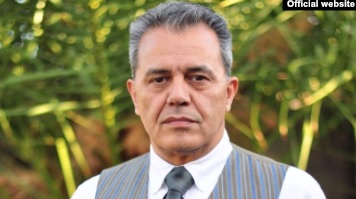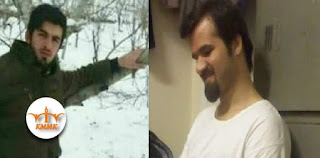Tuesday, August 4, 2020
The new tactic of the Iranian government is to kidnap the opposition abroad
ئاماری پێشێلکاریەکانی مافی مرۆڤ لە رۆژهەڵاتی کوردستان
کۆمەڵەی مافی مرۆڤی کوردستان: مانگی رابردوو ١١ کۆڵبەر و کاسبکاری کورد لە رۆژهەڵاتی کوردستان کوژراون و ٢٦ کۆڵبەر و کاسبکاری تریش برینداربوون
کۆمەڵەی مافی مرۆڤی کوردستان: لە مانگی حەوتی ئەمساڵدا ٩ هاوڵاتی کورد لە زیندانەکانی ئێران لە سێدارەدراون و ٣١چالاکوانی سیاسی و مەدەنی لە لایەن هێزە ئەمنیەکانەوە دەستبەسەر کراون
Statistics of human rights violations in Iranian Kurdistan
July
On July 11, Kurds were killed and 26 others were wounded by Iranian forces in border areas.
In the same month, nine people were executed in prisons and 31 Kurdish political and civil activists were arrested by Iranian security forces.
My report on NRT and Radio NAWA
چیرۆکی ئەو پەنابەرەی رۆژهەڵات کە لە ئێران هەڵهات و لە هەولێر حوکمدرا
"لە ئێران بەتۆمەتی سیخوڕیکردن بۆ پارتی بە 10 ساڵ حوکم دراوەو لە هەولێریش بەتۆمەتی سیخوڕیکردن بۆ ئێران بە 4 ساڵ حوکمدراوە"
راپۆرتێك له ئێن ئاڕ تی
Wednesday, July 29, 2020
Turkey restricts freedom of expression
كاردانهوهی زۆری لێكهوتهوه.. به سانسۆری ئازادیهكان دادهنرێت
توركیا بهیاسایهك دهچێته شهڕی تۆڕه كۆمهڵایهتیهكان
نهوا- محهمهد حهسهن ئهمینی
پهرلهمانی توركیا پڕۆژهیاسایهكی پهسهندكرد، كه به دانانی كۆت و بهند بۆ تۆڕه كۆمهڵایهتیهكان دادهنرێت و نیگهرانی بهرههڵستكارانی حكومهت و رێكخراوهكانی داكۆكیكار له ئازادی رادهربڕینی لێكهوتوهتهوه.
بهپێی یاساكهی پهرلهمانی توركیا، ههر تۆڕێكی كۆمهڵایهتی كه زیاتر له یهك ملیۆن بهكارهێنهری له توركیادا ههبێت، پێویسته نوسینگه لهو وڵاته بكاتهوه و داواكاری حكومهت بۆ سڕینهوهی ههندێك بابهت جێبهجێ بكات.
ئهوهش خراوهتهڕوو، كه سهرپێچی كۆمپانیاكانی تۆڕه كۆمهڵایهتیهكان لهو یاسایه دهبێته هۆی ئهوهی دهستپێگهیشتن به تۆڕهكانیان له توركیا پهكبخرێت.
رهشنوسی ئهو پڕۆژهیاسایه له لایهن پارتی داد و گهشهپێدانی دهسهڵاتدار و پارتی نهتهوهپهرهستی هاوپهیمانیهوه ئامادهكرابوو.
رهجهب تهیب ئهردۆغان سهرۆكی توركیا تۆڕه كۆمهڵایهتیهكانی به "نائهخلاقی" دهزانێت و چهند جارێك داوای كردبوو به توندی كۆنتڕۆڵ بكرێن.
ئینتهرنێت و تۆڕه كۆمهڵایهتیهكان رۆڵی گرنگیان له گهیاندنی پهیامی بهرههڵستكارانی حكومهتی توركیادا ههیه، لهو رووهوه ئهو ههنگاوهی حكومهتی داد و گهشهپێدان به كۆت و بهندی ئازادیهكان ناوبراوه و به هاشتگی "به یاسای سانسۆر بڵی نا" دژی ئهو یاسایه وهستاونهتهوه.
رێكخراوی لێبوردنی نێودهوڵهتیش پهسهندكردنی یاسای سنورداركردنی كاری تۆڕه كۆمهڵایهتیهكانی به نوێترین و زهقترین هێرشی سهر ئازادی رادهربڕین له توركیا ناوبردووه.
ئاندرۆ گارنهر توێژهری لێبوردنی نێودهوڵهتی بۆ كاروباری توركیا رایگهیاندووه، پهسهندكردنی یاساكه دهستی پۆلیس و هێزه ئهمنیهكان بۆ سانسۆری ناوهرۆكی تۆڕه كۆمهڵایهتیهكان ئاوهڵا دهكات و دهبێته ههڕهشهی زیاتر لهسهر ئهو كهسانهی كه پێشتریش تهنها به هۆی رادهربڕینهوه بهشێوهیهكی بێ بهزهییانه له لایهن حكومهتهوه كرابوونه ئامانج.
لهبهرامبهردا حكومهتی توركیا رهتیكردۆتهوه، كه پهسهند كردنی یاساكه بۆ سانسۆركردن بێت و جهختی كردۆتهوه، كه تاكه ئامانجیان رێكخستنهوهی پهیوهندیه یاسایی و بازرگانیهكانه لهگهڵ تۆڕه كۆمهڵایهتیهكان.
توركیا له ساڵانی رابردوودا بهردهوام له رووی ئازادی كاری رۆژنامهوانی، ئازادی رادهربڕین و ئازادی كاری سیاسی و ریچكخراوهیی له پاشهكشێدابووه و زۆرترین ژمارهی بهرههڵستكارانی حكومهتی ئهو وڵاته، له رۆژنامهوانان، چالاكوانانی مهدهنی و رۆژنامهنوسان بهتایبهتی كوردهكان راپێچی گرتوخانه كراون و ئهو وڵاته به یهكێك له گهورهترین زیندانهكانی رۆژنامهوانان دادهنرێت.
https://www.radionawa.com/Ku/all-detail.aspx?Jimare=37812
The Turkish parliament has passed a controversial law controlling social media that human rights groups say poses a serious threat to freedom of expression.
The law requires foreign social networks with more than one million users inside Turkey to have a local office and representative office in the country and to comply with content removal requests.
Companies face fines for violating the new law, and their data exchange speeds may be severely limited.
Facebook and Twitter have not yet responded to the new rule.
Turkish President Recep Tayyip Erdogan has called social media "immoral" and has publicly called for tight control.
The draft law was presented to parliament by the ruling Justice and Development Party and its ally, the National Movement Party. The two parties hold a majority in the Turkish parliament, and their plan was approved on Wednesday (July 29th).
Under the new law, social networks may face a 95% reduction in bandwidth, which effectively means stopping the use of these networks.
The Internet is a vital tool for dissidents and critics of the government in Turkey, who say the new law will lead to more censorship by the government.
The hashtag "Say no to censorship" has been trending in Turkey since the day it was passed.
Amnesty International described the passage of the law as "the latest and perhaps most obvious attack on freedom of expression in Turkey".
"Internet law significantly increases government access to police force for censorship of virtual content and poses a greater threat to those who have previously only expressed dissent," said Andrew Garner, a Turkish affairs researcher at the human rights group. "They have been brutally targeted."
A spokesman for the Turkish presidency has denied using the law for censorship, saying it is aimed at shaping legal and commercial relationships with social media.
Saturday, July 25, 2020
Baneh: Sentence of imprisonment and flogging for 10 civil activists protesting the killing of Kulbers
Statement by the French unions on the killing of kolbar by the armed forces of the Iranian government
Wednesday, July 15, 2020
Saber Sheikh Abdullah and Diako Rasoulzadeh were executed
Zahra Mohammadi was sentenced to ten years in prison
Tuesday, July 7, 2020
An analyst critical of Iran's policies has been killed in Baghdad
After 2003 and the fall of Saddam Hussein's regime, Iran's political, military and security influence in Iraq increased.
In 2011 and after the withdrawal of a large number of US troops from Iraq, Iran's influence and authority in Iraq increased.
The war with ISIS provided another opportunity for Iran to increase its hegemony in Iraq, especially through financial and military support from militant groups.
According to a recent Reuters report, Iran donates $ 2-3 million a month to these groups.
These groups, which are directly commanded by Iran, have repeatedly attacked US coalition forces and US bases and embassies.
Iranian-backed forces also played a role in suppressing last year's protests in Iraq.
During the protests, which were attended by many protesters who opposed Iran's presence and influence, Iran's allied forces killed several Iranian activists.
Mr. Hisham al-Hashimi was a supporter of the demonstrators and a staunch opponent of Iran's allied groups.
Hashemi has said several times that he has been threatened by groups under Iranian command.
Monday, July 6, 2020
The Iraqi government has banned the activities of Iranian Kurdish parties. According to a new decree by Iraq's National Security Adviso...

-
The war in Gaza has been going on for more than two weeks, some observers believe that the Kurdish media has a record of mistakes in cover...
-
.. Chronology of Iranian assassinations outside its borders Mohammad Amini In recent days, the Kurdistan Free Life Party, an Iranian oppos...













